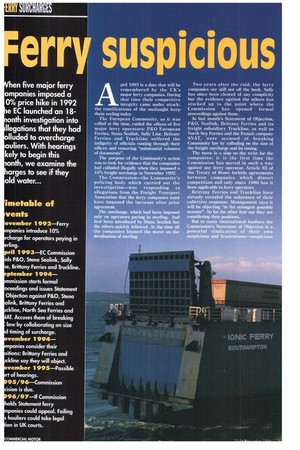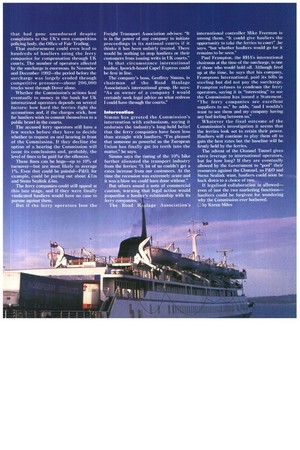err suspicious
Page 56

Page 57

If you've noticed an error in this article please click here to report it so we can fix it.
April 1993 is a date that will be remembered by the UK's major ferry companies. During that time their competitive integrity came under attack: the ramifications of the onslaught keep them reeling today.
The European Community. as it was called at the time, raided the offices of five major ferry operators: P&O European Ferries, Stena Sealink, Sally Line. Brittany Ferries and Truckline suffered the indignity of officials rooting through their offices and removing "substantial volumes of documents".
The purpose of the Community's action was to look for evidence that the companies had colluded illegally when they imposed a 10% freight surcharge in November 1992.
The Commission—the Community's policing body which carried out the investigation—was responding to allegations from the Freight Transport Association that the ferry companies must have imposed the increase after prior agreement.
The surcharge, which had been imposed only on operators paying in sterling, had first been introduced by Stena Sealink but the others quickly followed. At the time all the companies blamed the move on the devaluation of sterling. Two years after the raid, the ferry companies are still not off the hook. Sally has since been cleared of any complicity but the evidence against the others has stacked up to the point where the Commission has opened formal proceedings against them.
In last month's Statement of Objection, P&O. Sealink, Brittany Ferries and its freight subsidiary Truckline, as well as North Set.' Ferries and the French company SNAT, were accused of breaking Community law by colluding on the size of the freight surcharge and its timing.
The move is a slap on the wrist for the companies: it is the first time the Commission has moved in such a way against any ferry operator. Article 85 of the Treaty of Rome forbids agreements between companies which distort competition and only since 1986 has it been applicable to ferry operators.
Brittany Ferries and Truckline have already revealed the substance of their collective response. Management says it will be objecting "in the strongest possible manner". So far the other four say they are considering their positions.
But to many international hauliers the Commission's Statement of Objection is a powerful vindication of their own suspicions and frustrations—suspicions that had gone unendorsed despite complaints to the UK's own competition Policing body, the Office of Fair Trading.
That endorsement could even lead to hundreds of hauliers suing the ferry companies for compensation through UK courts. The number of operators affected by the surcharge is enormous. In November and December 1992—the period before the surcharge was largely eroded through competitive pressure—about 200,000 trucks went through Dover alone.
Whether the Commission's actions lead eventually to money in the bank for UK international operators depends on several factors: how hard the ferries fight the accusations and, if the charges stick, how far hauliers wish to commit themselves to a public brawl in the courts.
The accused ferry operators still have a few weeks before they have to decide whether to request an oral bearing in front of the Commission. If they decline the option of a hearing the Commission will issue its conclusions and, probably, the level of fines to be paid for the offences.
These fines can be huge—up to 10% of turnover—but are most likely to average 1%. Even that could be painful—P&O, for example, could be paying out about Lim and Stena Sealink .C4m.
The ferry companies could still appeal at this late stage, and if they were finally vindicated hauliers would have no case to pursue against them.
But if the ferry operators lose the Freight Transport Association advises: "It is in the power of any company to initiate proceedings in its national courts if it thinks it has been unfairly treated. There would be nothing to stop hauliers or their customers from issuing writs in UK courts," In that circumstance international haulier, Ipswich-based Capel Express could be first in line.
The company's boss, Geoffrey Simms, is chairman of the Road Ilaulage Association's international group. Ile says: "As an owner of a company I would certainly seek legal advice on what redress I could have through the courts."
Intervention Simms has greeted the Commission's intervention with enthusiasm, saying it endorses the industry's long-held belief that the ferry companies have been less than straight with hauliers. "I'm pleased that someone as powerful as the European Union has finally got its teeth into the matter," he says.
Simms says the timing of the 10% hike further alienated the transport industry from the ferries: "A lot of us couldn't get a rates increase from our customers. At the time the recession was extremely acute and it was a blow we could have done without."
But others sound a note of commercial caution, warning that legal action would jeopardise a haulier's relationship with its ferry companies.
The Road Haulage Association's international controller Mike Freeman is among them. "It could give hauliers the opportunity to take the ferries to court" ,he says, "but whether hauliers would go for it remains to he seen."
Piml Frampton, the RDA's international chairman at the time of the surcharge, is one of those who would hold off. Although fired up at the time, he says that his company, Framptons International, paid its bills in sterling but did not pay the surcharge. Frampton refuses to condemn the ferry operators, saying it is "interesting" to see the Commission has issued a Statement. "The ferry companies are excellent suppliers to us," he adds, "and I wouldn't want to see them and my company having any had feeling between us."
Whatever the final outcome of the Commission's investigation it seems that the ferries look set to retain their power. Hauliers will continue to play them off to gain the best rates but the baseline will be firmly held by the ferries.
The advent of the Channel Tunnel gives extra leverage to international operators, but for how long? If they are eventually allowed by the Government to "pool" their resources against the Chunnel, as P&O and Stena Seafink want, hauliers could soon be back down to a choice of two.
If legalised collaboration is allowed— even of just the two marketing functions— hauliers could be forgiven for wondering why the Commission ever bothered.
L by Karen Miles








































































































